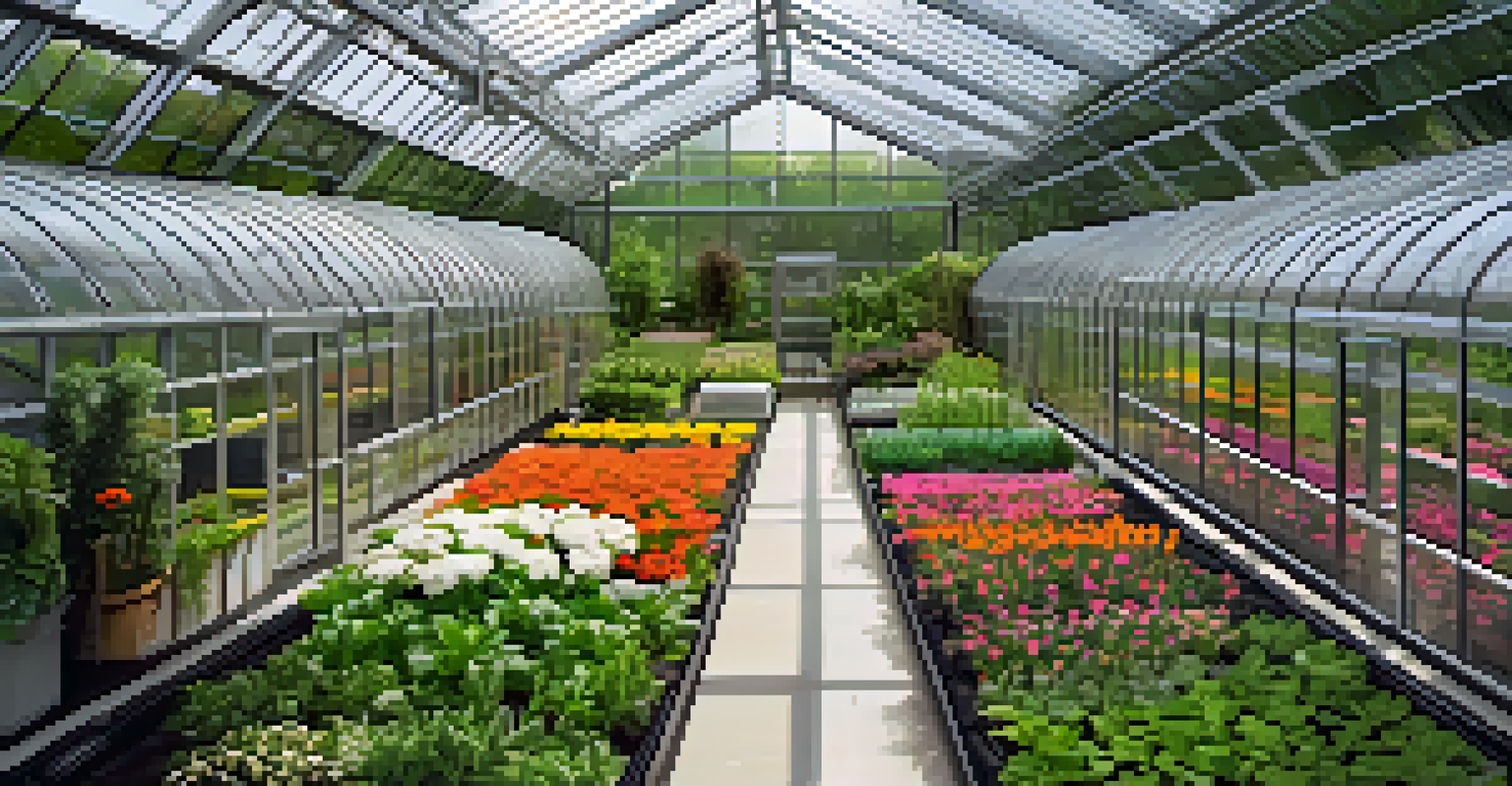Organic vs. Conventional: Hallucinogen Farming Practices

Understanding Hallucinogen Farming: An Overview
Hallucinogen farming involves cultivating plants that produce psychoactive compounds, such as psilocybin mushrooms and peyote. These crops have been used for centuries in various cultures for spiritual and medicinal purposes. Recently, interest in these substances has surged, leading to discussions about farming practices. Understanding the distinction between organic and conventional methods is crucial in this context.
The greatest danger in times of turbulence is not the turbulence; it is to act with yesterday's logic.
Organic farming emphasizes sustainability, biodiversity, and the use of natural processes to grow crops. On the other hand, conventional farming often relies on synthetic fertilizers and pesticides to boost yield and control pests. The choice of farming method can significantly impact not only the quality of the hallucinogens produced but also the surrounding ecosystem. This article will delve deeper into these farming practices and their implications.
As society's perception of hallucinogens shifts, so does the approach to their cultivation. By exploring organic and conventional farming practices, we can gain insights into sustainability, health, and ethical considerations. Let's take a closer look at what sets these two methods apart.
Organic Farming Practices in Hallucinogen Cultivation
Organic farming practices focus on using natural inputs and promoting ecological balance. In hallucinogen cultivation, this means utilizing organic compost, crop rotation, and companion planting to enhance soil health. Farmers may also rely on natural pest control methods, such as introducing beneficial insects, which helps maintain a balanced ecosystem. The result is often a product that is free from synthetic chemicals.

One significant advantage of organic farming is its positive impact on local biodiversity. By avoiding harmful pesticides and fertilizers, organic farmers create habitats for various organisms, promoting a richer ecosystem. This approach not only benefits the plants but also the surrounding wildlife, fostering a healthier environment overall. Additionally, organic practices can lead to higher quality products that some consumers prefer.
Organic vs. Conventional Farming
The choice between organic and conventional farming methods significantly affects the quality, safety, and environmental impact of hallucinogens.
Moreover, organic hallucinogens are often sought after for their perceived purity and safety. Many users believe that organically grown substances provide a more authentic experience, free from the potential side effects of chemical residues. As interest in natural and holistic health grows, the demand for organically cultivated hallucinogens is likely to increase.
Conventional Farming Methods in Hallucinogen Production
Conventional farming practices in hallucinogen cultivation typically prioritize efficiency and maximum yield. Farmers may use synthetic fertilizers to promote rapid growth and increase the volume of their harvest. While this method can lead to higher short-term profits, it raises concerns about the long-term sustainability of the practice. The use of chemicals can also affect the quality of the end product.
Sustainability is no longer about doing less harm. It's about doing more good.
Another aspect of conventional farming is pest management, which often involves the use of chemical pesticides. While these substances can effectively control pest populations, they may also pose risks to human health and the surrounding environment. This reliance on chemicals can lead to issues such as soil degradation and reduced biodiversity, making conventional methods a contentious choice among growers.
It's essential for consumers to understand the implications of choosing conventionally farmed hallucinogens. While they may be more readily available and cheaper, the potential health risks and environmental impacts should not be overlooked. As the conversation around sustainable practices continues, consumers may find themselves weighing the benefits of conventional methods against the values of organic farming.
The Impact of Farming Practices on Hallucinogen Quality
The quality of hallucinogens can be significantly influenced by farming practices. Organic methods often yield products with richer flavors and higher concentrations of active compounds, which may enhance the psychoactive experience. Conversely, the use of synthetic inputs in conventional farming can lead to a dilution of these compounds, potentially affecting the overall experience for users.
Moreover, the presence of chemical residues from conventional farming can alter the safety profile of hallucinogens. While organic practices strive for purity, conventionally grown products may carry risks associated with chemical exposure. This aspect is particularly important for consumers who prioritize health and wellness in their choices.
Environmental Sustainability Matters
Organic farming practices promote ecological health and biodiversity, while conventional methods can lead to environmental degradation.
Ultimately, the choice between organic and conventional hallucinogens may come down to personal preferences and values. Some consumers may prioritize quality and sustainability, while others may seek affordability and accessibility. Understanding the nuances of each farming practice can empower consumers to make informed decisions.
Environmental Considerations in Hallucinogen Farming
Environmental sustainability is a key consideration in the debate between organic and conventional farming. Organic practices tend to promote soil health, reduce pollution, and enhance biodiversity, which can lead to long-term ecological benefits. For instance, organic farmers often employ techniques that protect waterways from runoff, ensuring cleaner ecosystems.
In contrast, conventional farming methods may contribute to environmental degradation. The overuse of chemical fertilizers and pesticides can lead to soil erosion, water contamination, and loss of biodiversity. These practices can create a cycle of dependency on synthetic inputs, which ultimately harms the environment and the future of farming.
As awareness of environmental issues grows, many consumers are choosing to support sustainable practices. This shift in consumer behavior is prompting more farmers to adopt organic methods, not only for the health of their crops but also for the well-being of the planet. By choosing organic hallucinogens, consumers can play a role in promoting environmentally responsible farming practices.
Economic Factors Influencing Hallucinogen Farming
Economic factors play a significant role in the choice between organic and conventional farming practices. Organic farming often requires more labor and time, which can lead to higher costs for producers. However, this investment can pay off in the long run, as consumers are increasingly willing to pay a premium for organic products that they perceive as healthier and more sustainable.
On the other hand, conventional farming can yield quick profits due to its reliance on synthetic inputs. Lower production costs and higher yields often attract farmers seeking immediate financial returns. However, this short-term focus can overlook the potential long-term consequences of environmental degradation and market fluctuations in chemical prices.
Economic Factors Influence Choices
Economic considerations, such as production costs and consumer demand for organic products, play a crucial role in shaping farming practices in hallucinogen cultivation.
Ultimately, farmers must balance economic viability with ethical considerations in their practices. As the market for hallucinogens continues to evolve, understanding these economic factors will be crucial for producers looking to thrive. Consumers, too, can influence these dynamics by choosing to support sustainable practices through their purchasing decisions.
Future Trends in Hallucinogen Farming Practices
The future of hallucinogen farming practices is likely to be shaped by ongoing research and changing societal attitudes. As more studies unveil the potential therapeutic benefits of hallucinogens, the demand for responsibly grown products will likely increase. This trend could drive more farmers to adopt organic practices in a bid to meet consumer expectations for quality and sustainability.
Technological advancements may also play a role in transforming farming methods. Innovations in organic farming techniques, such as precision agriculture, can help optimize yields while minimizing environmental impact. These developments could bridge the gap between traditional organic practices and modern efficiency, making it easier for farmers to produce high-quality hallucinogens sustainably.

As the conversation around drug policy continues to evolve, regulations surrounding hallucinogen farming may also change. Future policies may encourage organic cultivation methods, promoting environmental stewardship and public health. By keeping an eye on these trends, both consumers and farmers can navigate the future of hallucinogen farming with informed choices.